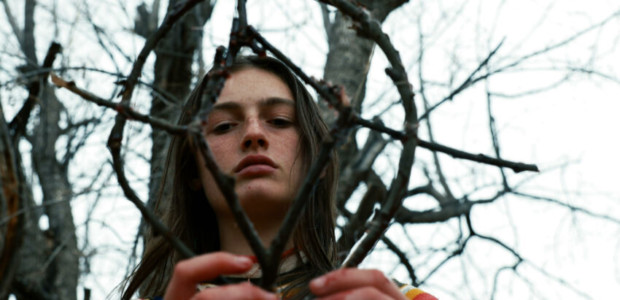“Growing up is hell,” and so many staples of the horror genre work to examine this universal truth. HELLBENDER harkens back to an impressively wide spread of such classics from CARRIE to JENNIFER’S BODY to RAW, all while forging a path entirely its own. The process of coming of age for a young girl is inextricably linked with horror, riddled with blood, torment, and psychological warfare, and HELLBENDER’s 16 year old protagonist, Izzy (Zelda Adams), is no exception. Izzy lives in isolation with her mother (Toby Poser), who forbids her to go out into the “real world” as a result of a severe immune disorder. A chance encounter leads Izzy to discover hidden facets of herself and her ancestry that shift her world on its axis.

HELLBENDER is a story about family at its core, so it couldn’t be more fitting that it was created by a real-life family: Toby Poser, John Adams, and their children Zelda and Lulu Adams serve as the primary cast and crew. Filmed under quarantine amidst the ongoing Covid-19 pandemic, HELLBENDER is an example of the absolute pinnacle of what a home movie can be, its family made roots felt from the arresting opening scene to the final, bone chilling moment. It’s the kind of movie that dares you to look away, presenting you languid landscape images and sudden brutality in equal measure, never allowing you to settle into your comfort zone for very long. A film full of open doors that become harder and harder to shut, HELLBENDER tackles gargantuan themes of parenthood, creation, ancestral trauma, and human nature all through the simple and familiar vessels of a mother and her daughter just trying their best.
With immediacy, HELLBENDER captures the isolation that Izzy feels, all too familiar to many of us who will be watching. Living on a mountainside with her mother in a home that feels like it’s nowhere and anywhere as time passes in a nebulous sense, making every interaction feel just one tick off from reality, it’s impossible to find a foothold, disorienting the audience along with the characters. There are also the occasional musical interludes by Izzy and her mother’s band, Hellbender, that exist in an equally disorienting sort of black box rehearsal space that allow for conversations between mother and daughter with no outside distractions. And of course, there’s the fact that Izzy is not permitted to see anyone that instigates this sense of othering and isolation. Anybody beyond the two of them are not permitted on the property, leading to the question of if they are protecting themselves from others or protecting others from themselves.

Naturally, this bubble that they have created for themselves will need to burst, and the intensity of the isolation makes it all the more impactful when Izzy bumps into Amber (Lulu Adams), a neighbor of her own age. Lulu Adams’ Amber is so wonderful, the embodiment of every cool girl you ever wanted to impress in high school. As an audience member, we’re right there with Izzy as she attempts at playing it cool and navigates the internal melodrama of wanting so desperately to be liked while not wanting the other person to know how desperately you want them to like you. Amber is also the only outsider that we are able to feel this depth of fondness for. All other characters outside of the family- primarily men- all behave as intruders, unwelcome and threatening to the world built by Izzy and her mother. It’s in these moments where Toby Poser as Izzy’s mom transforms completely from the comforting and warm confidant she so often is around her daughter, to a harsh and unrelenting protector. Poser is an incredible presence, her weight felt in every frame of HELLBENDER, anchoring the movie with the deeply felt sense that she is just trying to be a better parent for her child than her parents were for her.
HELLBENDER operates at a relatively slow pace, with certain scenes and interactions that seem inconsequential to the larger story at hand. While not necessarily heavily plot driven, the movie does present you with big ideas and questions to stick with you long after it ends. The idea of creation seems to hang heavily over the world of HELLBENDER. As a primarily woman centric film, it is difficult to not see this idea through the feminine expectation to create rather than destroy. A woman’s body, self, and emotions are to be reserved for creation, but what happens if she wakes up one day and decides she’d rather tear something down instead? Beyond the actual act of creation though, there is also the phenomenon of the loss of control that comes once something has been created and released. Whether that creation be a film, a song, a human life, the creator loses most, if not all, of the agency and control they once had over this thing that they made. What happens to it is beyond you and nothing to do with you, even though when broken down to its most basic parts, it is you. This terrifying and overwhelming conundrum of the human condition is one that HELLBENDER reckons with on a cosmic level through its stunning imagery along with brief, but visceral gore elements.
HELLBENDER could be a challenge for the everyday moviegoer. It’s not straightforward and it leaves you with more questions than answers as the credits roll. For some it will be too esoteric, too meandering and reflective and stilted at times. While those are all valid criticisms to consider about the film, those who love it will love it fiercely. They will connect to its themes and existential questions on a molecular level. And isn’t it worth it to find out for yourself if you’re one of those people or not?
HELLBENDER is available on Shudder starting February 24th.


No Comments